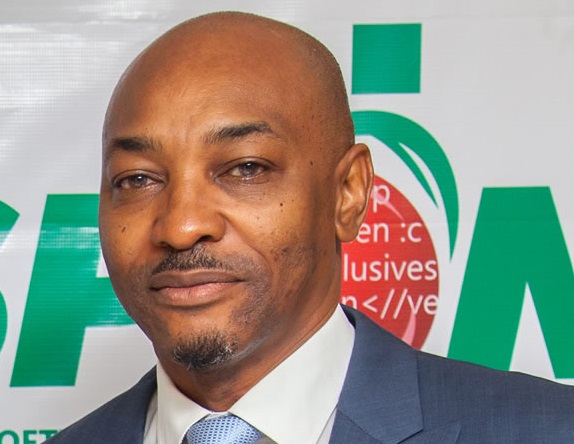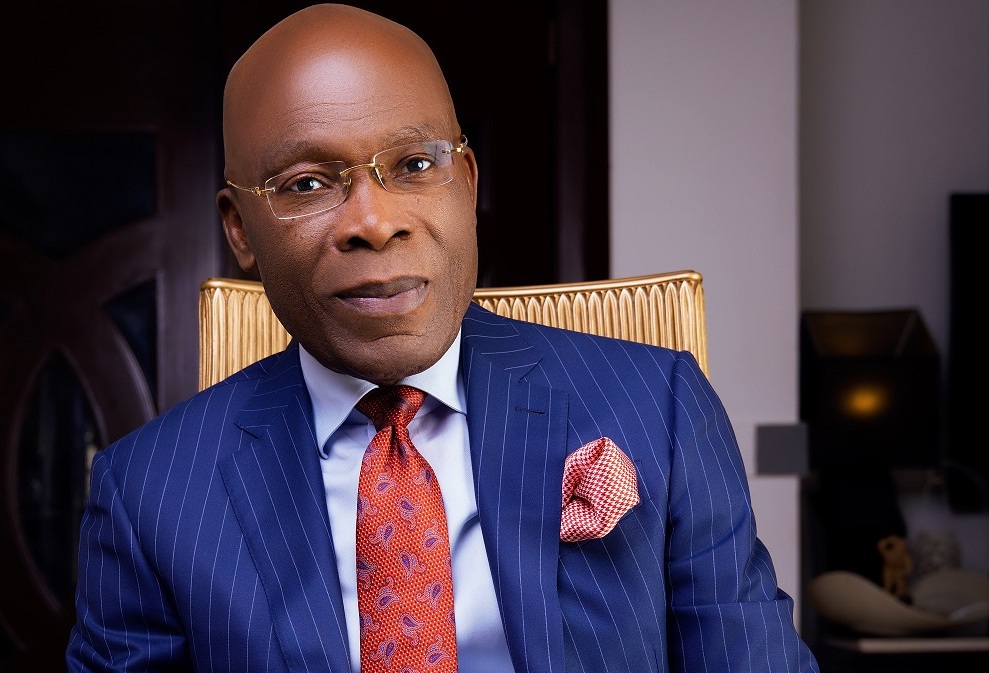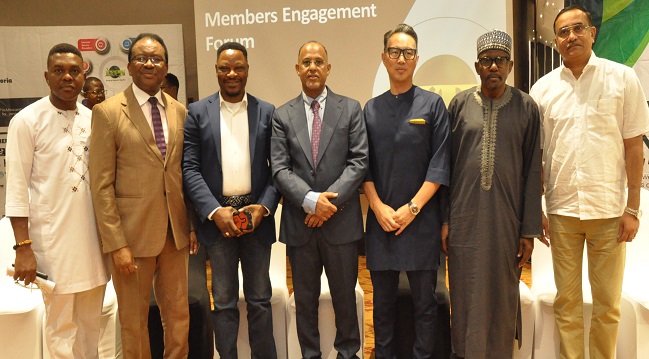Telecom
Mba-Uzoukwu, ISPON President Decries 30% Utilisation Rate of 11 Datacenters in Nigeria

Mr. Chinenye Mba-Uzoukwu, president, Institute of Software Practitioners Association of Nigeria (ISPON) has decried the under utilisation of the 11 data centres in Nigeria, putting the current utilisation rate at below 30%.

He noted that the low adoption indicated that despite the forecasted growth in installed capacity, the patronage by way of utilisation does not match the expected levels.
He made this known while speaking at a Technology Forum organized by the Nigerian Information Technology Reporters Association (NITRA) in Lagos, with the theme: “Achieving 30% Growth In Local Cloud Hosting By 2024”.
According to Mba-Uzoukwu, “we are faced with a puzzling question: the housing estates that our friends are building against all odds in a super-challenging environment, will they be occupied by offshore tenants or ourselves?”
“There are 11 datacenters in Nigeria and the largest are expanding their capacity constantly in anticipation of a growing demand but currently the utilisation of capacity probably sits at below 30%.
“With four certified Tier 3 Constructed Facilities in Nigeria and more on the way, the Africa datacenter market is expected to cross $3bn by 2025, growing at a CAGR over 12%.
“This indicates that despite the forecasted growth in installed capacity, the patronage by way of utilisation does not match the expected levels”.
Unformed report also indicates that Galaxy Backbone Limited which is the only Uptime Institute Certified Tier 3 Datacenter in the public sector (in Nigeria) is currently estimated at 38% capacity utilisation of its 2.5MW capacity.
To this end, the President of ISPON said, “We must ask why”.
“The 2020 GSMA report highlights that availability of internet services has not translated to adoption while there is no established correlation between broadband availability and indicators of innovation such as hubs and software companies e.g. Aba, Enugu, Calabar, Benin and Jos have limited broadband and predominantly 2.5G/3G networks yet host significant innovation activity.
“ISPON’s research indicates that this puzzling scenario is directly related to local software – local in the sense of being developed by Nigerians for Nigerians to solve Nigerian problems.
“While we have seen phenomenal growth in the fintech space, the vector and velocity for the evolution of Software Nigeria as a whole remains constrained by the extent to which the Digital Economy which is emerging is anchored on local innovation and local utilisation.
“The datacenters performance is driven by users are large corporates and MNCs for whom data services are not taken lightly as they commit to long-term relationships on the basis of reliability especially High Availability which is indexed to global standards. In this context, Digital Transformation, especially in the public sector is critical pre-requisite.
“Digital Transformation delivers joined-up government that enables the policy and process of governance to ride on top of IT infrastructure from broadband to software solution stacks. It also presents opportunities for entrepreneurship and innovation to flourish as solution providers get work to do. For this dynamic to be accelerated and proliferated, it is difficult to over-estimate or emphasise the importance of the Local Cloud which must be the initial point of access for a broad-based digital adoption and transformation strategy in a rising tide that lifts all.
“We often fail to recognise and prioritize this fundamental – perhaps it is an inconvenient truth?
“There is much to unpack in this but it will suffice to say that ISPON believes that the Software Nigeria and Data Nigeria are conjoined twins – separating the two is not only difficult but in this case, it is foolhardy because what we share is vital to the survival of each twin. Let us therefore proceed with this in mind!”
He also applauded NITRA for hosting the event, adding that ISPON sees the Association as an integral component of the technology ecosystem as partners as well as practitioners whose largely unsung efforts have been pivotal to the emergence of the industry we celebrate today as Africa’s most vibrant and fastest evolving technology ecosystem.
“ISPON celebrates you, one and all!
“We are therefore extremely pleased to be a part of this celebration and the discussions that follow will be one more block laid by NITRA in the tremendous role being played by your Association and members in the growth of the Digital Economy.
“We thank you for what you do and once again, give our assurances of a continued partnership.
Chike Onwuegbuchi, Chairman of Nigeria Information Technology Reporters’ Association (NITRA), said that the theme was carefully selected to enable stakeholders in the information and Communications Technology to discuss issues that will bring growth and development to the sector.
“This edition”, he said, “we are looking at local cloud hosting a very important aspect of technological development.
“Cloud computing has been described as the greatest game changer since the creation of the internet and is one of the fastest growing areas of technology today. It can be simply defined as renting time on a computing infrastructure over the internet, rather than building your own from the ground up. In a way, it could be described as outsourcing your computer infrastructure.
“Cloud computing offers scalability and reliability that cannot be matched by a single enterprise.
“Today, we are talking of data protection. How can you protect data that is warehoused outside of our shores?
“Local cloud hosting also helps to keep our local internet traffic local as local content providers host their content in-country.
He also recalled that NITDA in 2019 launched Nigeria’s Cloud computing policy and one of the goals of this Policy is to ensure a 30% increase in adoption of cloud computing by 2024 among Federal Public Institutions (FPIs) and SMEs that provide digital-enabled services to the government.
“The policy also targets 35% growth in cloud computing investments by 2024. It is on this that we selected the theme of today’s event.
“When we are talking about local cloud hosting we can’t achieve it if we don’t patronize local datacenters; this informed the presences of datacentre operators in this discourse.
The Forum attracted industry stakeholders including corporate organisations; Nigeria Internet Registration Association (NiRA); Internet Exchange Point of Nigeria (IXPN); Cloudflex; Layer3; Vintage Confluence LLC and industry associations – ISPON, ALTON, ATCON, NCS, amongst others.
Telecom
Uwaje Pays Tribute to Leo Stan Ekeh @70

Renowned digital innovation expert, Prof. Chris Uwaje, has celebrated Leo Stan Ekeh as a visionary “digital anticipator” and pioneer on the occasion of his 70th birthday.

Leo Stan Ekeh
In a heartfelt tribute, Uwaje hailed Ekeh as the “Saint Leo of all Stars from the Ekeh Universe,” saluting his masterclass contributions to human innovation, development, and global youth empowerment.
Visionary Impact on Africa, World
Uwaje praised Ekeh’s foresight, emotional intelligence, and resilience in transforming digital entrepreneurship, creating millions of jobs, billions in economic value, and expanded education access worldwide.
The encomium spotlighted Ekeh’s trailblazing solutions driving sustainable development, employment, and economic growth across Africa and beyond.
“Your legacy continues to shape a brighter future,” Uwaje noted, adding that Ekeh’s “extraordinary best is yet to come” as the “Field-Marshall of ANTICIPATORS.”
Cheers to More Foresighted Legacy
Uwaje declared: “From the gaze into the digital cloud: ‘the world ain’t seen nothing yet’!” while toasting Ekeh as the “true digital Conqueror of Africa and the world.”
The tribute underscores Ekeh’s enduring influence in digital disruption, innovation, and youth-focused initiatives that continue to inspire global progress.
Telecom
IXPN Positions as the Regional Internet Exchange Hub for West Africa

Internet Exchange Point of Nigeria is positioning as a regional Internet Exchange hub for West Africa in terms of infrastructure and traffic. Muhammed Rudman, chief executive officer, IXPN, stated this at its 2026 members engagement forum held in Lagos. He noted some of the major milestone IXPN achieved last year to include one terabit of traffic recorded in March 2025.

“At that time, we became the 63rd internet exchange point in the world. Among all the exchanges in Europe and America and in the entire world, we become the number 63 in the world. To achieve that one terabit of traffic. Again, we were able to achieve two terabits of traffic within seven, eight months of the year.
“We achieve this by ensuring that we push for members to upgrade, those that were on 1 Gig to 10 Gig, those on 10 Gig to 100 Gig. We had a strategic infrastructure upgrade across our networks, put 400 Gig enable switches, increase our fiber links to all the data centers and we onboarded 17 new members last year. All the trainings and the operational excellence ensured that our network is up and running 24/7,” he said.
Industry Impact
The impact of that one terabit traffic is data sovereignty. “We were able to domesticate. Based on the survey we conducted, 54% of our members said that they are exchanging 50% of their traffic and above locally, which is really, significant one.
“We are also setting up a benchmark for other African IXPs. I can assure you that in all the community driven internet exchange points in Africa, we are the number one. There’s a community driven internet exchange point in South Africa that was established 10 years before IXPN. There is one in Kenya that was established 6 years before IXPN, but we are way ahead of them when it comes to internet traffic.
“We are also promoting intra African connectivity. As at today, we have customers from Niger, from, Burkina Faso, trying to reach to Nigeria. Recently, we onboarded a very large company in Ivory Coast, to connect to Nigeria.
“Gradually, Nigeria is tilting towards becoming the regional hub for West Africa, where you see Internet Service Providers coming to achieve that. And in terms of the traffic, in 2015 we were at four Gigabits per second. It moves to 21 in 2017 and 52 gigabits per second.
“But by the year 2023 it has reached 540 gigabits. By 2024 we have reached 900 gigabits. But by the end of 2025 we have achieved the two terabits of traffic”.
Network Infrastructure Development
Some of the technical feet IXPN achieved includes, deployment of sFlow; which is a peer to peer traffic analysis. “We’re able to see what members are exchanging between themselves and between the data centers, not the actual content or information, but rather the volume of traffic, and also between our data centers. And based on this, we’re able to do the upgrades.
“We did a multiple link upgrades from 300 Gigabits last year from Digital Realty to Equinix. It was 300 Gig as at the end of 2024, and by 2025, we’ve increased that to 500 gigabits per second. Digital Realty to Rack Center, it was 200 Gigabits per second. We also upgraded that to 500 Gigabits per second.
Open Access Data Centre to Equinix. We’ve upgraded from 20 Gigabits per second to 200 Gigabits per second. We always monitor the ports, and based on that, we increase immediately we reach the threshold of 80%.
“We did an upgrade on the IXP manager. This allows each member to have a login portal to see the traffic they are exchanging and other details, the port as well as to do their own configuration,” he added.
Technical Project Milestones
Microsoft connected cache. “We deployed Microsoft content cache and that has been deployed in Lagos. It was 25 Gigabits per second as of 2024 by 2025 we had to upgrade the infrastructure to 75 Gigabits per second servers, that will be able to accommodate all the Microsoft updates they are doing, exports, download and among others.
“This is part of the content that Microsoft is not providing locally, but we got those servers deployed, and our intention is by next year to see how we can replicate this across the country. Last year, we also deployed the same server in Abuja so that the Abuja people and the Kano people can reach that content without coming back to Lagos.
The Google Global Cache (GGC); “We are hosting all these at IXPN. We also upgraded from 53 Gigabits per second servers in 2024 to 153 Gigabits per second. And this is a huge traffic of YouTube. And as we speak, we are also working towards upgrading those servers,” he explained.
Strategic Partnerships
“We signed an MoU last year between us and an IXP in Senegal, when we went for West African peering forum. A lot of African ISPs are looking to us to see how we can guide them and support them.
“For example, internet exchange point from Gabon, internet exchange point from Rwanda and ISPs in Africa are looking at us as a model to copy, and we tend to support them. We also had a strategic partnership with CIRA, the Canada Internet Registry Association, which is similar to Nira, the Nigerian Internet Registration Association, to have their secondary authoritative servers into Nigeria as an anycast instance. And when they are hosting that, they are hosting other top-level domains as well, like alibaba.info.org.ca, are also hosted with us.
“Since they launched last year, we have seen a traffic of over 1000 DNS responses per second. Presently, there are 13 global root servers in the world, and those 13 servers are the ones that translate your IP address into a domain name. Any website you browse, you put a domain name, it translates into an IP address and its chain of referrals, Nigeria has.ng as a country, called Top Level Domain”.
Earlier in his welcome address, Charles Nmeregini, Business Development Manager, IXPN, said that the members engagement forum is more than an annual country. “Today, we pause to celebrate the milestone, the milestone that we have reached together, the milestone that have bolstered our local traffic exchange, reduce latency and significantly lower the cost of Internet access across the nations and beyond.
“However, today is equally about the horizon. It is a strategic moment as we unveil our 2026 service road map, a forward-looking rubbing designed to deepen interconnection, enhance service delivery and unlock new value across the ecosystem. In an era defined by rapid technological shift, standing still is not an option.
“This forum will spotlight exclusive, strategic business opportunities, new avenues for growth, enhanced pairing capabilities and innovative service model tailored to give your organization a competitive edge. We are not just exchanging data, we are exchanging ideas that will drive the next wave of Nigeria digital economy,” he added.
Telecom
Menxtt NG Emerges as Nigeria’s Virtual IT Hub for Premium Devices, Solutions

In today’s rapidly evolving digital landscape, having a trusted and reputable IT partner is no longer optional—it’s essential. Consumers and businesses alike face numerous challenges: buying smartphones, tablets, and laptops that are substandard or incompatible, worrying about device security, and struggling with costly repairs when gadgets break down.

Menxtt NG
This is where Menxtt NG stands out as a true industry leader, providing EU-specification devices, nationwide service, and unmatched support across Nigeria.
As an official BitDefender reseller, Menxtt NG ensures that every device comes fortified with premium cybersecurity solutions. This addresses one of the biggest issues consumers face today: digital threats. With Menxtt NG, customers don’t just get a gadget—they get peace of mind knowing their data and devices are protected.
Beyond security, the company solves a critical problem in tech ownership: the lack of reliable warranties and repair services. Many users find themselves forced to buy new devices due to broken phones, laptops, or tablets.
Menxtt NG addresses this by offering repair services for all major gadgets, saving customers significant money while extending the life of their devices. And for new devices, they provide fully tested EU-spec phones, laptops, and tablets with a 6-month warranty, ensuring both performance and durability.
Accessibility is another barrier Menxtt NG tackles head-on. With free nationwide delivery and a free charging cord included with purchases, they make premium technology available across Nigeria.
Their presence in Ola Ayeni Street, Computer Village, Ikeja, combined with easy contact via 08115919964, 08140902614, 0802 061 1299, 0802 893 1940, +234 916 642 2759, as well as online support at www.menxtt.com.ng and [email protected], ensures convenience for every customer.
Anthony Nwosu, CEO of Menxtt NG, highlights the company’s mission: to deliver top-quality, secure, and durable devices while providing accessible repair and support services.
This comprehensive approach addresses all the pain points consumers face—device quality, security, warranty, and after-sales care—making Menxtt NG more than just a retailer; it’s a reliable IT partner.
In a market flooded with subpar devices and unreliable service, Menxtt NG proves that choosing a reputable IT plug is crucial. With EU-spec devices, nationwide delivery, genuine warranties, and expert repair services, Menxtt NG doesn’t just sell technology—they empower customers to enjoy, protect, and maximize the life of their devices.

 Telecom3 days ago
Telecom3 days agoBanks, Telcos Settle Four-Year Dispute over N300Bn USSD Debt

 General News2 days ago
General News2 days agoHow JustMarkets Is Empowering African Traders with Global Market Access

 E-Financial2 days ago
E-Financial2 days agoACAMB Educates Content Creator to Curb Misinformation on Bank Recapitalisation

 Telecom2 days ago
Telecom2 days agoGroup Condemns Gabon’s Social Media Shutdown Amid Protests

 General News3 days ago
General News3 days agoPalmPay Unveils First Batch of Winners in #LoveWithPalmPay Campaign

 E-Business2 days ago
E-Business2 days agoMutual Benefits Assurance Settles ₦5.9bn Claims in January 2026

 E-Financial3 days ago
E-Financial3 days agoFirstCap MD says Payment Security Remains Biggest Barrier to Bankable Gas and Power Projects

 Telecom2 days ago
Telecom2 days agoIXPN Positions as the Regional Internet Exchange Hub for West Africa
























